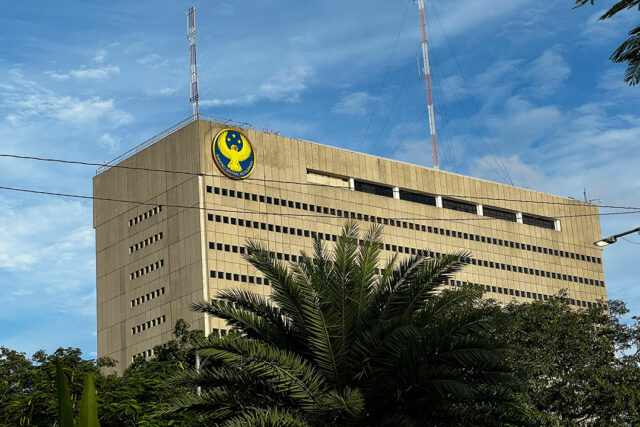Better services, better governance in Makati
State of the City Address of Mayor Abby Binay at the Rotary Club of Makati, Jan. 14, 2025
When I was first elected Mayor of Makati, our city was already a city of immense promise and possibilities. Makati has long been a symbol of economic power, a hub of innovation in governance, and a community with a vibrant culture. As a First Class City in terms of income, we knew our progress was only the beginning. We could achieve more.
“But I believed then, as I do now, that a city as great as ours could not settle for “pwede na,” or “good enough.” We needed to aim higher, and push further. We needed to do better.”
 Good governance is more than a commitment in Makati — it is our bedrock. We have shown our commitment to transparency, efficiency, service, and innovation to meet the growing demands of our business community and our citizens. And for these, we have earned recognitions from local and international organizations.
Good governance is more than a commitment in Makati — it is our bedrock. We have shown our commitment to transparency, efficiency, service, and innovation to meet the growing demands of our business community and our citizens. And for these, we have earned recognitions from local and international organizations.
These include the first LGU in the Philippines to receive the Data Privacy Seal of Compliance, a Seal of Good Local Governance from the DILG, and seven consecutive unmodified audit opinions from the Commission on Audit.
We have made government services accessible to over 5.2 million online users, redefining public service delivery in the process. Through business-friendly policies like our one-stop shop and the Makatizen Card, we empowered micro, small, and medium enterprises while strengthening our digital economy.
Transforming Education
 Education is the greatest investment we can make for our youth. It is also Makati’s enduring legacy. During my term, we have instituted new programs to ensure that every child has the tools to learn and adapt, while looking after their health and nourishment. With smart classrooms, renewable energy in schools, and innovative initiatives like the Library Book Mobile, we were able to address learning gaps while preparing students for a fast-changing world.
Education is the greatest investment we can make for our youth. It is also Makati’s enduring legacy. During my term, we have instituted new programs to ensure that every child has the tools to learn and adapt, while looking after their health and nourishment. With smart classrooms, renewable energy in schools, and innovative initiatives like the Library Book Mobile, we were able to address learning gaps while preparing students for a fast-changing world.
I am proud to share that Makati’s Benigno Ninoy Aquino High School (BNAHS) was the only public school in Metro Manila to score above the minimum proficiency level in the 2022 Program for International Students Assessment or PISA.
This achievement underscores our commitment to providing quality education that meets global
standards.
The revitalized Makati City Scholarship Program has also empowered students from all walks of life, producing graduates who have earned Latin honors and pursued advanced studies abroad. As part of our commitment to higher education, the University of Makati School of Law (UMak SOL) continues to
make its mark as one of the country’s top-performing law schools.
In 2024, the UMAK SOL had a bar passing rate of 90.91% and ranked number #2 among Law schools with 11 to 50 bar examinees.
Advancing Healthcare
 We regard access to quality Health care as a right, not a privilege. The city has invested over P8 billion to provide free maintenance medicines to thousands of Makatizens through the Makati Health Plus (Yellow Card) program. Since 2017, this program has served over 800,000 patients, ensuring that essential medications are accessible to those in need.
We regard access to quality Health care as a right, not a privilege. The city has invested over P8 billion to provide free maintenance medicines to thousands of Makatizens through the Makati Health Plus (Yellow Card) program. Since 2017, this program has served over 800,000 patients, ensuring that essential medications are accessible to those in need.
In addition, we have been providing free and unlimited dialysis treatments to our citizens. Since its launching in 2020, we have extended 166,677 sessions to 19,268 residents. We have also provided 9,000 free chemotherapy sessions to cancer patients since 2020, further demonstrating our dedication to
comprehensive healthcare services, especially to those who cannot afford the cost of these treatments.
Our investments in the city’s social infrastructure has led to significant improvements in the lives of our Makatizens.
Social and Economic Progress
In 2023, Makati’s poverty incidence stood at an impressive zero point six percent (0.6%), the lowest it has ever been, and one of the lowest, if not the lowest, among major cities. Our Human Development Index or HDI, which measures the quality of life of citizens based on the quality of health, education, and standard of living, also rose to zero point nine zero three (0.903). The HDI goalposts, set by the United Nations Development Program or UNDP, range from zero to one.
A greener Makati is a better Makati. We have built a city prioritizing sustainability through initiatives like the Urban Greening Program, which planted over 5,500 trees, and renewable energy projects like solar panel installations in schools.
With the GHG Reduction Ordinance and clean-up drives revitalizing waterways, Makati is leading the way in environmental stewardship, ensuring a sustainable future for future generations.
UNDRR: First Resilience Hub in the Philippines and Southeast Asia
For our efforts, the United Nations Office for Disaster Risk Reduction (UNDRR) named Makati the First Resilience Hub in the Philippines and Southeast Asia. Additionally, I have been appointed a member of the United Nations Secretary-General’s Advisory Group on Local and Regional Governments, contributing to the advancement of the 2030 Agenda for Sustainable Development and the New Urban Agenda.
Safer, Better, and More Secure Communities
Safety and security have also been our top priorities. We have strengthened disaster resilience and public safety through advanced monitoring systems, and a pro-active disaster response plan.
Our new police and fire headquarters and state-of-the-art equipment have further enhanced the capabilities of the Makati Police Department to protect the Central Business District and our barangays. I am pleased to report that the Makati PNP has made considerable progress in crime prevention and resolution. Over an eight year period, from 2016 to 2024, the total number of crime cases in Makati decreased significantly, from 867 cases in 2016 to 295 cases in 2024. Additionally, the Makati PNP’s Crime Solving Efficiency rate has improved from 69.78% in 2016 to 76.9% in 2024.
Financial Stability
All of these would not have been made possible without your participation and support. Since 2016, Makati’s financial stability has reached historic levels. From P16 billion in 2016, our city’s revenues have grown to over P24.15 billion in 2024. With over P22.2 billion of our income generated locally, our sound fiscal policies have supported these transformative programs, programs that have made Makati a better city and have made the quality of life of our citizens so much better.
Reflecting on Makati’s Legacy
 Our achievements in Makati — in good governance, economic growth, education, sustainability, healthcare, and more — prove that progress is possible when people are at the center of every decision.
Our achievements in Makati — in good governance, economic growth, education, sustainability, healthcare, and more — prove that progress is possible when people are at the center of every decision.
“And there is no reason why our groundbreaking social programs,
primarily in in health and education, cannot be implemented on a national level. With the right priorities, partnerships, and determination, these initiatives can uplift communities across the Philippines.”
Where ‘Pwede Na’ is Never Enough, We Strive for Excellence!
Makati has shown that “hindi pwede ang pwede na” is not just a slogan but a commitment to doing what is right and delivering what is needed. When we focus on transparency, innovation, and
compassion, we create solutions that work and improve lives.
Let us carry this vision forward — not just for the people of Makati, but for every Filipino.
Spotlight is BusinessWorld’s sponsored section that allows advertisers to amplify their brand and connect with BusinessWorld’s audience by publishing their stories on the BusinessWorld Web site. For more information, send an email to online@bworldonline.com.
Join us on Viber at https://bit.ly/3hv6bLA to get more updates and subscribe to BusinessWorld’s titles and get exclusive content through www.bworld-x.com.












